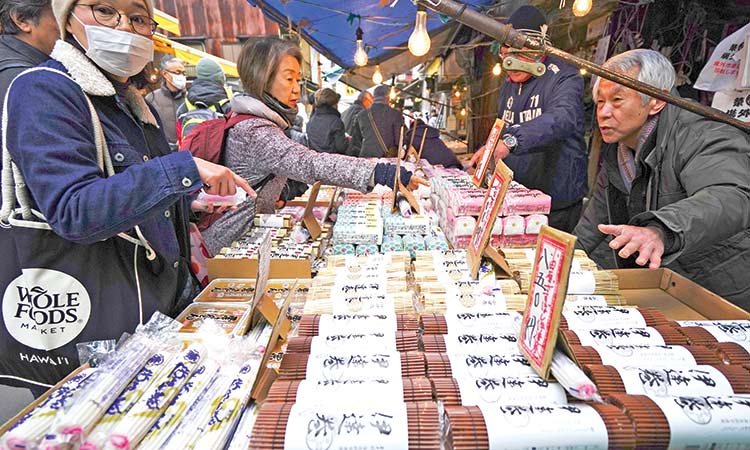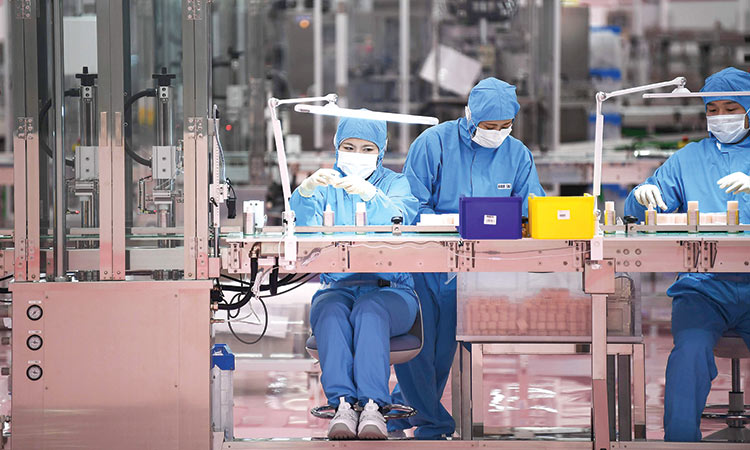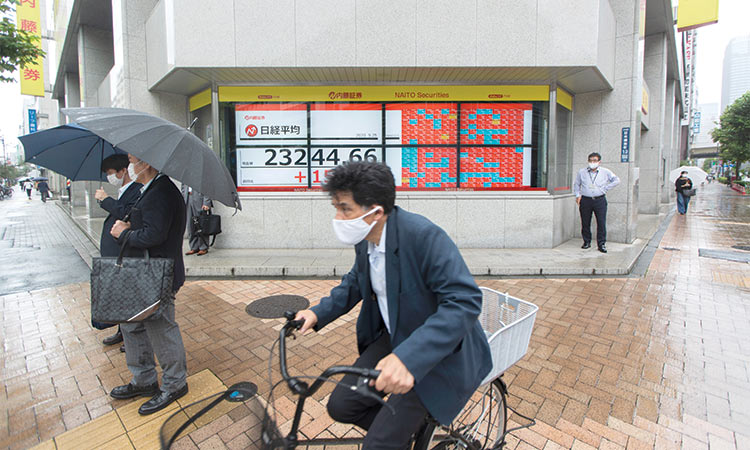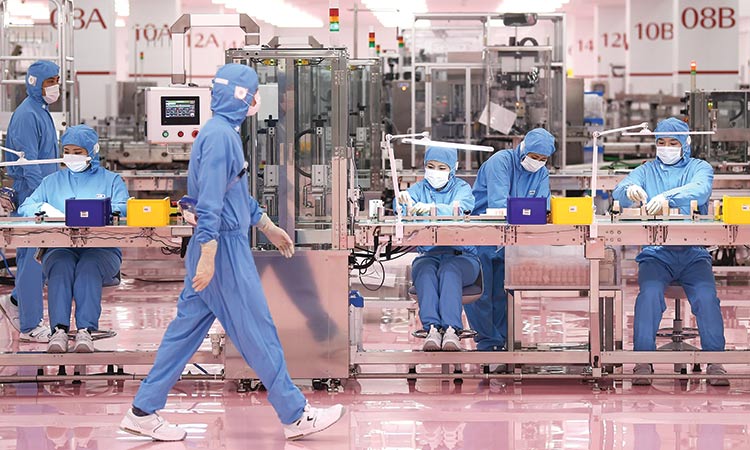Japan’s factory output and retail sales fall shows economic woes

Shoppers buy food products at a market in Tokyo on Friday. Associated Press
Japan’s economy has cooled in recent months due to a prolonged hit to exports from soft global demand and a slide in consumer spending following a nationwide tax hike.
Official data showed factory output fell 0.9% in November from the previous month, a slower decline than the 1.4% fall in a Reuters forecast.
That followed a downwardly revised 4.5% decline in the previous month, the largest month-on-month slump since the government started compiling the data in comparative form in January 2013.
“The overall economy including factory output is expected to contract sharply in the current quarter,” said Yoshiki Shinke, chief economist at Dai-ichi Life Research Institute.
“It is expected to rebound in January-March but the issue is how much it will recover.”
Production was pushed down by a decrease in output of production machinery and information equipment, which offset a bounce back in output of cars and car engines.
“There is still uncertainty for the economic outlook as the effects from the US-China trade friction will likely remain but there are positive signals for a moderate pickup in factory output,” said Hiroaki Mutou, chief economist at Tokai Tokyo Research Institute.
Manufacturers surveyed by the Ministry of Economy, Trade and Industry expect output to gain 2.8% in December and rise 2.5% in January, the data showed.
Separate data released on Friday showed retail sales dropped a larger-than-expected 2.1% in November as consumer sentiment stayed depressed after October’s sales tax hike.
The weak readings could pressure the government to come up with new ways to boost growth and force the central bank to maintain its stimulus programme.
“Economic sentiment has worsened overall,” said Shudai Hasegawa, a shopkeeper at a store selling rice, pickles and other foods in Tokyo’s Shinagawa area.
“There are fewer people in the shopping street here from the start of the year compared to the previous year, and also after the tax hike,” he said earlier this month.
Kota Watanabe, manager of a store selling pillows and futon mattresses, said demand from older consumers over 50 has been weak this year, partly due to warm weather.
“They say they are satisfied with cheap goods. There are also people saving money for their children instead of spending it themselves.” The broader economy is likely to stay under pressure as weak business and consumer confidence and a delayed pickup in global growth hurt demand.
The government last week cut its overall view on the economy for the fourth time this year due to a downgrade in its assessment of manufacturing output.
The Bank of Japan stood pat last week though it warned risks to the recovery remained high and offered a gloomier view on output.
Japan’s government last week approved a record budget for the coming fiscal year. Part of the planned spending will help finance a $122 billion fiscal package to shore up growth.
Meanwhile, Japan’s jobless rate fell in November, while the jobs-to-applicants ratio held steady, suggesting the nation’s tightest jobs market in decades is holding up.
The seasonally adjusted unemployment rate fell to 2.2% in November from 2.4% in the previous month, Ministry of Internal Affairs and Communications data showed.
The jobs-to-applicants ratio was unchanged at 1.57 in November from the previous month, health ministry data showed.
Meanwhile, Japan’s Nikkei dipped but the broader market firmed on Friday, and is on course to wrap up the quarter with the biggest gains since 2017 on the back of easing US-China trade tensions. The Nikkei share average shed 0.36% to 23,837.72, though about a half of the loss came from Fast Retailing , which has a disproportionately big weighting of about 10% in the index.
The Nikkei is still not far from a 14-month top of 24,901 touched in early December, and with only one trading day left for the year, it could log its best quarter in two years.
The broader Topix gained 0.11% to 1,733.18, with advancers outnumbering decliners by 71 to 29, an unusually high ratio compared to small gains in the Topix.
The market is supported by hopes that the United States and China will sign off on an interim trade deal early next year, with cyclical value shares attracting buying.
“The markets should have an upside bias towards the 24,000 level. Japanese macro-economic data wasn’t bad, also helping the mood,” said Takeo Kamai, head of execution at CLSA.
Japan’s jobless rate unexpectedly fell to match a 27-year low hit earlier this year and Tokyo-area consumer price inflation unexpectedly accelerated 0.2 per centage point to 0.8%.
On the other, industrial output slipped to the lowest since early 2013 though the fall was smaller than expected and the data did nothing to change the view that the manufacturing sector is bottoming out thanks to a detente in the U.S.-China trade war.
Reuters







